Important Lessons Can Be Learned From How This Redditor And Their Incredible Doggo Handled A Dangerous Situation
There is nothing more distressing than an apprehensive experience with a bigger dog. And no, we don’t have anything against big dogs.
In fact, it’s the total opposite. It's simply a reality that their actual size makes them all the more ready to break free and overwhelm their owners.
The owners being referred to are, in many cases, just a little bigger than the actual dogs! This is similar to what the Redditor named duchess_of_fire in today’s story came into contact with, and it wasn’t a small thing to handle at all.
According to the story, which was shared with the r/dogs subreddit community, the OP snuck out of a meeting to take her dog (a Great Dane, Lab, Amstaff mix ~80 lbs) for a quick walk since the sun was shining brightly. Fifteen minutes into the walk, they saw an old lady and her Great Pyrenees about 15 ft away.
As soon as her dog saw the OP’s dog, it started snarling and lunging at the Great Dane. The most shocking part of this whole event was when the dog owner started yelling that she couldn’t hold back her dog.
The situation intensified as the OP’s dog started growling back and trying to get away as well, while the Great Pyrenees kept drawing the old lady closer and closer. What is going to happen next?
Find out as you read the full story below.
I heard the words...
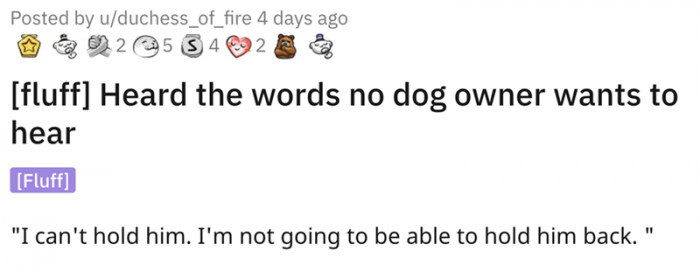
Snuck out of a meeting...
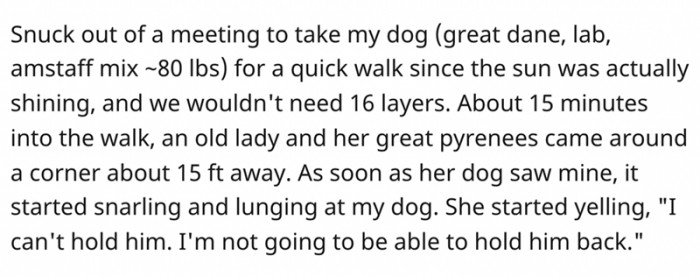
A dog has gone after my dog before
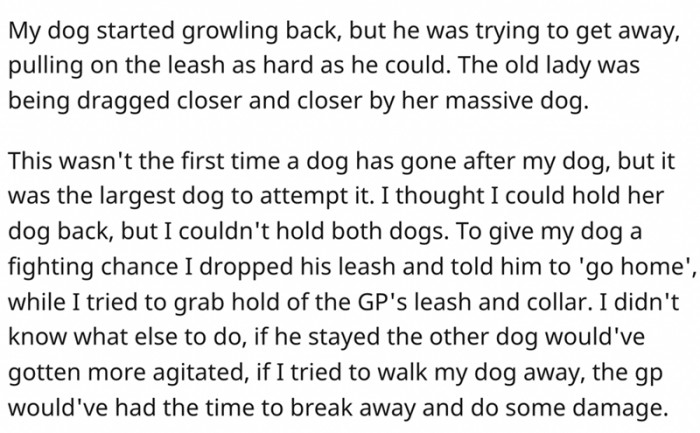
Encounters with aggressive or larger dogs can elicit significant fear responses in owners, which is not uncommon. Research published in the Journal of Anxiety Disorders indicates that individuals often experience heightened anxiety levels in situations where they perceive a threat to their physical safety. This fear can activate the body's fight-or-flight response, leading to physiological reactions such as increased heart rate and shallow breathing. It's essential to recognize that these reactions are not just emotional but are deeply rooted in our biological makeup, reflecting an evolutionary response to danger.
Understanding the psychological underpinnings of fear helps illuminate why some dog owners might feel overwhelmed in the face of a larger, unruly dog. The research suggests that educating owners about canine behavior and implementing training strategies can significantly mitigate these fears.
In examining the dynamics of owner-dog relationships, social support plays a vital role in how owners cope with fear. Research from the Journal of Social Issues indicates that social support networks can buffer against anxiety and stress. For dog owners, having a community of fellow dog owners or trainers can provide emotional reassurance and practical advice, making them feel less isolated in their experiences.
By building these networks, owners can share their fears and strategies, which not only helps in managing their anxiety but also enhances their dog-handling skills. Supportive relationships can also facilitate better communication between owners and their dogs, leading to improved behavioral outcomes and a more harmonious coexistence.
My dog took off without me and the other dog started calming down
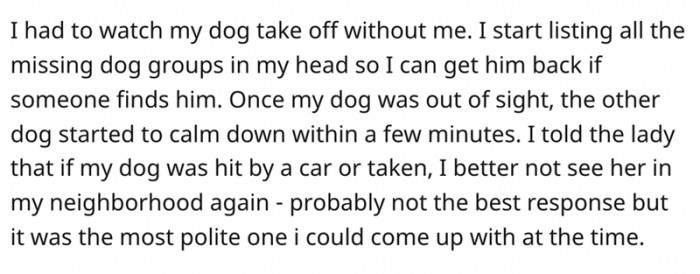
The race home while searching for the doggo must have been agonizing for the OP. You can only imagine the joy OP felt upon seeing her doggo sitting tight and waiting for her at home after being confronted with such an imminent danger.
The Redditor, who is also the author of this story, went ahead to share the lessons learned from this experience.
Trying to remember where I left my car keys

Take aways from my experience
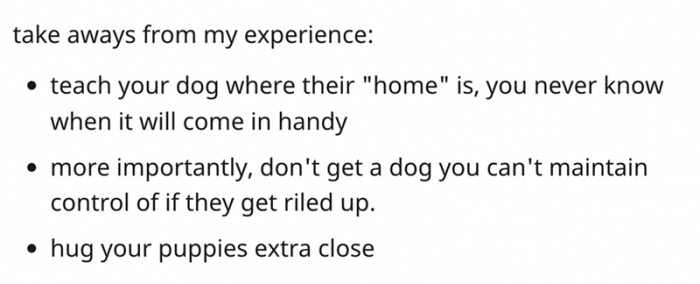
The Psychology of Attachment
The bond between dogs and their owners often mirrors human attachment styles, a concept extensively documented in developmental psychology. Dr. Mary Ainsworth's research on attachment theory has shown that secure attachments foster greater trust and resilience in the face of stressful situations. When owners feel a strong emotional connection to their pets, they are better equipped to handle fear-inducing circumstances.
Conversely, an insecure attachment style may result in heightened anxiety and a feeling of helplessness when facing challenges. This dynamic highlights the importance of building a secure relationship with pets, which can be achieved through consistent training, positive reinforcement, and quality time spent together. Such approaches not only strengthen bonds but can also help owners feel more confident during stressful encounters.
Other Redditors had so much to say, and they wasted no time in utilizing the comments section. Some shared similar stories of their own while others expressed pride in the OP for having trained the dog well.
We’ve gathered some of the most upvoted comments, so keep scrolling and check them out.
A dog well trained to stop a confrontation

I didn't train my dog to do this
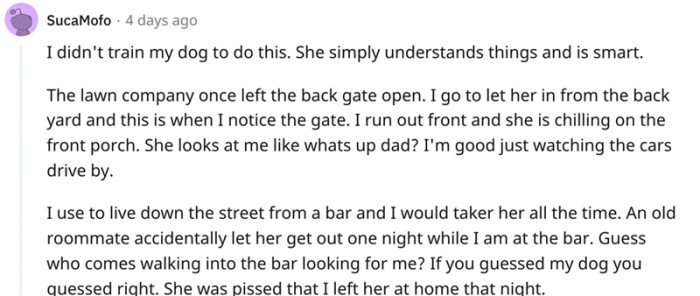
My boyfriend's mom is notorious for forgetting to close the gate
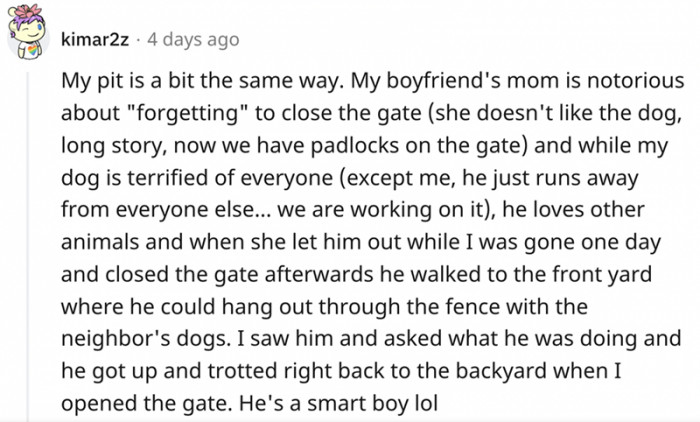
Behavioral psychology provides valuable insights into how fear can manifest in dog owners, particularly through learned responses. According to Dr. Ramani Durvasula, a clinical psychologist, "Negative experiences with dogs can lead to conditioned fear responses, where past traumas create anxiety in similar future encounters, even if the current dog poses no real threat." This phenomenon is known as classical conditioning, where the emotional response to one stimulus (the fear of the dog) generalizes to other situations. To counteract these conditioned fears, Dr. John Gottman, a renowned marriage researcher, suggests that exposure therapy is often recommended: "Gradually introducing the owner to controlled interactions with dogs can help desensitize them to their fears, ultimately fostering a healthier relationship with larger dogs."
The owner tumbled out of the jeep

If you can't physically control your dog then...

My MIL wants to walk the dog so badly...
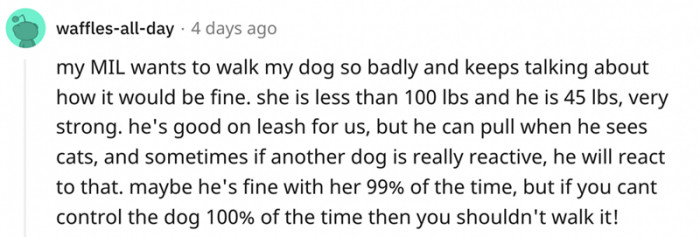
Practical Solutions for Fear Management
For dog owners facing anxiety in stressful situations, there are several effective strategies grounded in psychological research. Techniques such as mindfulness and grounding exercises can help individuals manage acute anxiety when confronted with fears. According to Dr. Rick Hanson, a neuropsychologist, "Mindfulness is a powerful way to cultivate resilience and calmness in the face of fear." Additionally, behavioral strategies such as positive reinforcement training for both the dog and the owner can promote confidence. Owners can benefit from enrolling in training classes that teach them how to manage their dogs effectively, reducing the likelihood of feeling overwhelmed. Resources like Dr. Terri Orbuch, a relationship researcher, highlight the importance of building supportive relationships to enhance emotional well-being during stressful times.
There are things or situations that can leave one stunned and have you thinking, "What the heck just happened?" This story is one of those, and we are glad both the dog and its owner are safe and sound.
What do you think about this whole story? Leave all your replies and opinions in the comments section below.
Psychological Analysis
The behavior of the dog owner in this article highlights a common psychological phenomenon: the fight-or-flight response triggered by perceived threats. When faced with a larger, aggressive dog, the owner's instinctive fear can amplify feelings of helplessness, especially if they feel unequipped to control the situation. This reaction underscores the importance of building confidence through education and training, which can help mitigate anxiety and foster a stronger bond between owners and their pets.
Analysis generated by AI
Moving Forward: Actionable Steps
Understanding the psychological mechanisms behind fear responses in dog owners is crucial for developing effective coping strategies. Research from the National Institute of Mental Health indicates that these behavioral patterns can be modified through therapeutic interventions that focus on emotional regulation and behavioral desensitization. By implementing techniques such as exposure therapy and mindfulness practices, dog owners can gradually overcome their fears and foster a more secure bond with their pets. The key takeaway is that, with the right support and strategies, it's possible to transform fear into confidence, allowing for more enjoyable interactions with beloved dogs.



